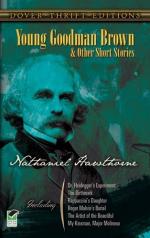|
This section contains 1,467 words (approx. 5 pages at 300 words per page) |

|
SOURCE: "The Ending of 'Young Goodman Brown'," in Studies in Short Fiction, Vol. III, No. 3, Spring, 1966, pp. 343-45.
In the following essay, Abcarian contradicts previous critics who state that the ending of Hawthorne's tale is anticlimactic and redundant
"Young Goodman Brown" is certainly one of Hawthorne's greatest stories and arguably one of the finest short stories ever written. With the economy of genius, Hawthorne dramatizes the discovery by a young and good man "that all deified Nature absolutely paints like a harlot, whose allurements cover nothing but the charnelhouse within . . ." [Herman Melville, Moby Dick] and the consequences of that discovery. The story is rich and ambiguous enough to have elicited a good deal of critical comment and controversy. However various the approaches and divergent the interpretations, the most illuminating and useful studies have maintained a respectfully critical attitude toward the story. Although many critics have been puzzled and...
|
This section contains 1,467 words (approx. 5 pages at 300 words per page) |

|


